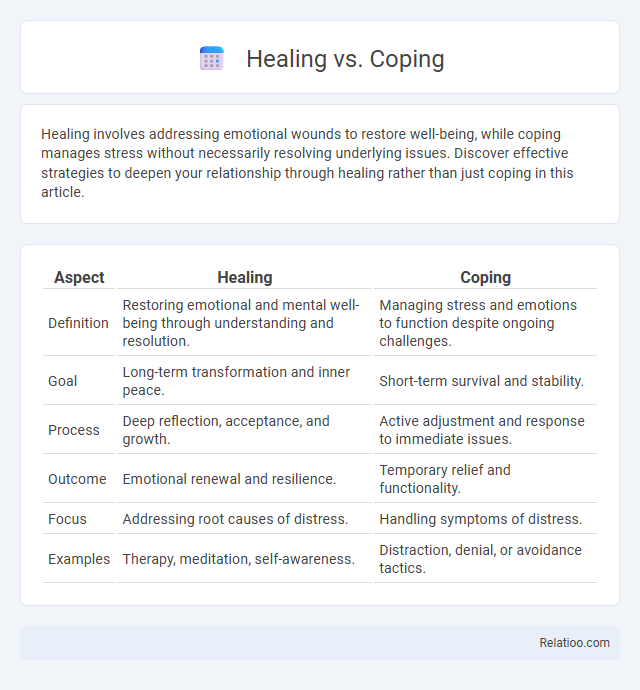Healing involves addressing emotional wounds to restore well-being, while coping manages stress without necessarily resolving underlying issues. Discover effective strategies to deepen your relationship through healing rather than just coping in this article.
Table of Comparison
| Aspect | Healing | Coping |
|---|---|---|
| Definition | Restoring emotional and mental well-being through understanding and resolution. | Managing stress and emotions to function despite ongoing challenges. |
| Goal | Long-term transformation and inner peace. | Short-term survival and stability. |
| Process | Deep reflection, acceptance, and growth. | Active adjustment and response to immediate issues. |
| Outcome | Emotional renewal and resilience. | Temporary relief and functionality. |
| Focus | Addressing root causes of distress. | Handling symptoms of distress. |
| Examples | Therapy, meditation, self-awareness. | Distraction, denial, or avoidance tactics. |
Understanding the Difference: Healing vs Coping
Healing involves addressing the root causes of trauma to restore emotional and psychological well-being, whereas coping refers to the strategies and behaviors used to manage stress and difficult emotions in the short term. Effective healing fosters long-term resilience and growth through therapy, mindfulness, or support groups, while coping may rely on temporary mechanisms like distraction or avoidance. Recognizing this difference is crucial for developing a comprehensive approach to mental health that moves beyond mere survival to genuine recovery.
Defining Healing: What It Truly Means
Healing transcends simply coping with trauma; it involves a deep restoration of emotional, psychological, and physical well-being after distressing experiences. True healing means transforming the impact of trauma into personal growth, resilience, and renewed strength, rather than merely managing symptoms or avoiding pain. Your journey toward healing requires intentional self-care, understanding, and often professional support to reclaim a sense of wholeness beyond survival.
Coping Mechanisms: Short-Term Relief or Long-Term Solution?
Coping mechanisms provide essential short-term relief by helping individuals manage stress and emotional pain during traumatic experiences. However, without addressing the root causes of trauma, these strategies often fall short of facilitating long-term healing or recovery. Effective healing integrates coping methods with therapeutic interventions to promote resilience and emotional growth over time.
Signs You’re Only Coping, Not Healing
Signs you're only coping, not healing, include persistent avoidance of painful emotions, reliance on distractions to numb distress, and repeated cycles of the same unhealthy patterns without true resolution. Your mind may resist confronting the root causes of trauma, leaving you stuck in survival mode rather than progressing toward recovery. Recognizing these signs is crucial for shifting from temporary relief to meaningful healing and long-term emotional well-being.
The Psychological Impact of Coping Strategies
Coping strategies play a crucial role in mitigating the psychological impact of trauma by influencing emotional regulation and stress management. Effective coping can promote resilience and foster healing by reducing symptoms such as anxiety, depression, and post-traumatic stress disorder (PTSD). Understanding how your coping mechanisms affect mental health enables tailored interventions that support recovery and long-term psychological well-being.
Benefits of Pursuing Genuine Healing
Pursuing genuine healing offers profound benefits beyond mere coping mechanisms, including emotional resilience, restored mental clarity, and long-term psychological well-being. Unlike coping, which often masks symptoms temporarily, true healing addresses the root causes of trauma, facilitating deep transformation and personal growth. Research in trauma therapy highlights that individuals committed to authentic healing experience reduced symptoms of PTSD, improved relationships, and enhanced quality of life.
Barriers that Prevent Healing
Barriers that prevent healing often include unresolved trauma, lack of social support, and inadequate access to mental health resources. Coping strategies may provide temporary relief but rarely address the root causes of trauma, leaving emotional wounds untreated. Your path to healing requires overcoming these obstacles through professional guidance, self-awareness, and a supportive environment.
Transformational Practices for Deep Healing
Transformational practices for deep healing target the root causes of trauma rather than simply coping with symptoms, enabling true recovery and growth. You engage methods such as somatic experiencing, mindfulness meditation, and expressive arts therapy, which facilitate emotional release and neural rewiring. These practices empower resilient change by addressing trauma's complex impact on the body, brain, and psyche.
Integrating Healing into Daily Life
Integrating healing into daily life involves conscious practices that foster emotional resilience and address trauma symptoms directly, such as mindfulness, self-compassion, and regular therapy sessions. Effective coping mechanisms may provide short-term relief but do not replace the deep, transformative process of healing that rewires neural pathways and restores psychological well-being. Prioritizing healing helps individuals build sustainable mental health, reducing trauma's long-term impact and enhancing overall quality of life.
Choosing Healing Over Coping: Steps Towards Wholeness
Choosing healing over coping requires acknowledging trauma's impact and committing to restorative practices such as therapy, mindfulness, and self-compassion. Healing fosters integration and growth by addressing root causes, whereas coping often emphasizes mere survival through avoidance or temporary relief. Prioritizing healing leads to emotional resilience, greater self-awareness, and long-term wholeness beyond the limitations of coping mechanisms.

Infographic: Healing vs Coping
 relatioo.com
relatioo.com